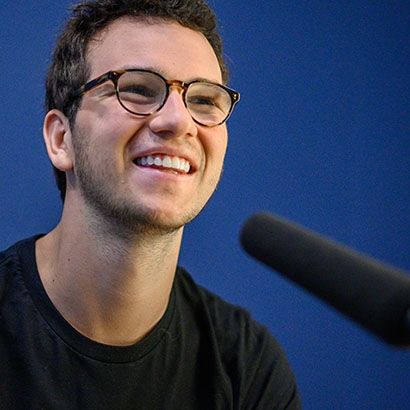Brian Brackeen’s Kairos has developed face recognition with applications well beyond security, but it’s required a lot of resilience to get there.
How many of you have had this experience? Over dinner with friends, you all come up with what sounds like a brilliant idea for a new app. Someone says, “We should do this.” Everyone agrees—and yet, how often does someone pick up the idea and run with it?
The ones who do, invariably have one of the traits essential to entrepreneurs: “Blind, irrational faith,” says Brian Brackeen, founder of Miami-based Kairos. “You have faith that the idea is almost divine and it was placed in you for a reason and that you are the person to take it to its natural conclusion.”
Yet passion in overdrive can lead an entrepreneur astray if it isn’t counter-balanced by the ability to listen to criticism and learn from rejection. Brackeen believes Kairos wouldn’t be a successful facial recognition startup going through Morgan Stanley’s Multicultural Innovation Lab today, if he hadn’t developed a method of looking objectively at every piece of feedback, positive or otherwise.
Gradations of ‘No’
“Let me see…I’ve probably had 900 no’s by this stage,” he laughs. “But there are degrees of ‘no’ — helpful no’s, and unhelpful ones.”
His most helpful feedback was the most painful of all. “Kairos started out in 2011 as a company building timeclock software for companies to monitor employees’ working hours,” explains Brackeen. “We were doing OK, but in 2014 I was told by someone I respect very much that if I wanted to make a ‘dent in the universe,’ as Steve Jobs once put it, then making the particular timeclock app we were making was not a big enough idea.”
Heeding that advice meant throwing away three years of work on an idea he’d left a career at Apple to pursue. Kairos’s timeclock product included facial recognition technology, but the market for its application was too small. His options were to push on with the timeclock product and risk underwhelming seed investors, or find a way to significantly expand the application of its facial recognition technology, to differentiate it from everything else in the market. “It was a difficult moment. Of course, the decision we made three years ago to differentiate ourselves by combining facial recognition technology with emotion analysis tools turned out to be the right one. But it meant losing our biggest backer at the time, and even running out of money at one point,” says Brackeen.
Biases
It wasn’t as if the Kairos team received advice from one person and decided to drop everything. Brackeen was already seeing increasing interest in a wider use of facial recognition, as he and his team went around pitching timeclock to customers and investors. The feedback he received about timeclock not being a big enough idea, validated already growing concerns about achieving the vision he had for Kairos’s growth over time.
As for the unhelpful no’s? “There are a lot of biases out there—racial biases, biases based on what school you went to and the social circles you move in,” he explains. “I’m not that guy who went to an Ivy League school and knows everyone in Silicon Valley.” He’s even run up against geographical biases. “I’ve been on calls, at cocktail parties, and even formal pitch meetings, where venture capitalists have said to me: ‘We don’t invest in Florida.’ You need to be able to step back and look at these comments objectively, and grade them for what they’re worth.”
Three years in, Brackeen and team feel like they are in a strong position. They see Kairos’s technology going beyond the security applications that most of their competitors focus on. By cross-referencing scanned biometric data on age, gender and ethnicity with the ability to detect real-time changes in emotions, Kairos can help business transform customer pain points — anything from shortening security wait lines to measuring customer engagement with the media — into a seamless experience.
The technology’s machine learning component also allows Kairos to improve with each face scanned, providing more value to its customers as its knowledge base grows.
Given the startup’s customer traction growth, Morgan Stanley mentors are now preparing Kairos for its pitch to investors for later-stage growth funding. The advice he’s now receiving? Execute on that expansive vision of how Kairos’s technology addresses a major market need for enterprises.
“We are really at a high point right now, so I might be saying this with the benefit of hindsight. But if someone came up to me today and said ‘I have an idea, should I start a company?’ I would say, go for it. There are many ways to learn about yourself in life, but none is as impactful or as fast as starting a company.”



